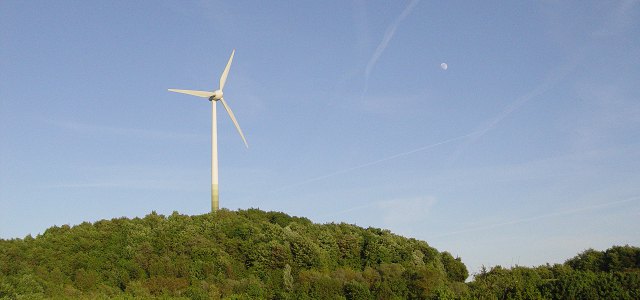The southeastern German state of Bavaria is arguably not much of a team player in the Energiewende. The state government does not want wind turbines, and opposition to new power lines ostensibly to bring in wind power from the north is fiercest among Bavarians. One proposal to fill the power gap is gas turbines. Craig Morris points out a few reasons why the strategy seems unrealistic.

Single wind turbine in Munich – the Bavarian government blocks further wind power and power lines development. (Photo by Thomas Wojcik, CC BY-SA 2.0)
Bavaria does not exactly have tremendous gas resources, and the public is highly unlikely to support fracking. Beer brewers are among the greatest opponents of shale gas exploration, and the Bavarian capital of Munich is home to Oktoberfest. So if the Bavarian government’s vocal support for gas turbines is not about tapping the state’s (non-existent) gas resources, what is the point?
The state government may be trying to save gas turbines, such as the one in Irsching discussed in my previous post. The idea originally was to replace nuclear power with these gas turbines, and it seems that top Bavarian politicians wish to stick to that plan – instead of replacing nuclear with renewables.
A month ago, Eon – which owns one of the two modern gas turbines in Irsching – announced that it wanted to shut down the unit entirely by next March. Tellingly, a Reuters report on the announcement speaks of the gas turbine as producing “baseload power.” What the Energiewende needs is definitely not baseload power, but rapid-response dispatchable capacity.

Renewables need flexible backup, not baseload.
Indeed, the firm has wanted to close a plant and sell it on the global market for years. It has been kept alive because Germany’s Network Agency (the grid regulator) found it to be necessary for the stability of the grid. In that case, the transit grid operator pays Eon a flat sum (Reuters puts the figure at “an annual double-digit million euro payment”) to keep the plant on standby.
The two modern gas turbines in Irsching were only used last year to stabilize the grid, so the firms officially requested permission from Germany’s Network Agency to close Irsching 4 and 5 next March (report in German). The two gas turbines would then remain on standby just in case the grid needs stabilizing.
Over the past year, power from these two turbines was generally not needed, but that situation could change with the shutdown of the first nuclear plant since 2011. In a few months, the Grafenrheinfeld reactor in northern Bavaria will be closed, potentially leaving a gap that Irsching could help to cover. But obviously, the firms themselves do not think the gas plant will be needed even then.
Perhaps the strangest aspect of all is the role of natural gas in the power sector. The heat sector has priority, and roughly half of German households have gas-fired heating systems. Quite sensibly, the supply of natural gas to power stations is discontinued before gas supplies to heating systems are switched off. Otherwise, a vicious cycle would occur when household switch to electric heaters after their gas supplies have been cut off; demand for electricity would then skyrocket, further increasing demand for gas in the power sector. In terms of efficiency, gas (like all fossil fuels used for energy) is better employed as a source of heat.
We don’t have cold winters in Germany every year any longer, but gas supplies are indeed still cut off in cold spells, with the last such event probably being in 2013. It is likely to happen again, making natural gas power plants unattractive as the main alternative to nuclear and coal.
The best solution would be to include natural gas, but in combination with biomass, wind, and solar. The Bavarian government’s strategy unfortunately seems to include only natural gas and solar. Bavaria has the most PV of any German state but has imposed draconian distance requirements for wind turbines, effectively preventing the further deployment of wind power in the state. By blocking power lines to connect Bavaria with the north, the state government essentially opposes imports of wind power as well. The gap is to be filled with power from natural gas – a strategy that seems unconvincing for the reasons given above. Most of all, the Bavarian government seems to want to be different rather than cooperate with other German states.
Craig Morris (@PPchef) is the lead author of German Energy Transition. He directs Petite Planète and writes every workday for Renewables International.
The powerlines from the north will not bring wind, but electricity from open-cast mining and brown coal fired power stations in Saxony to Bavaria.